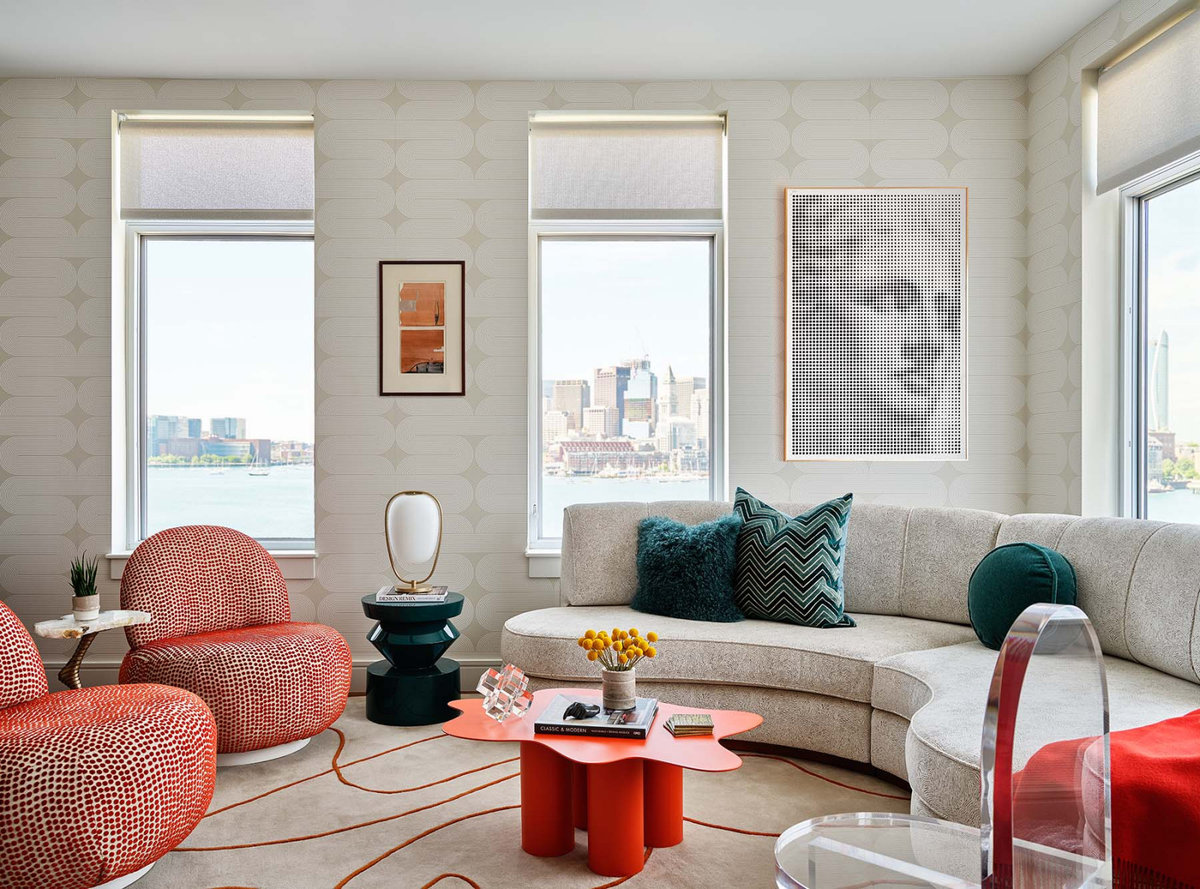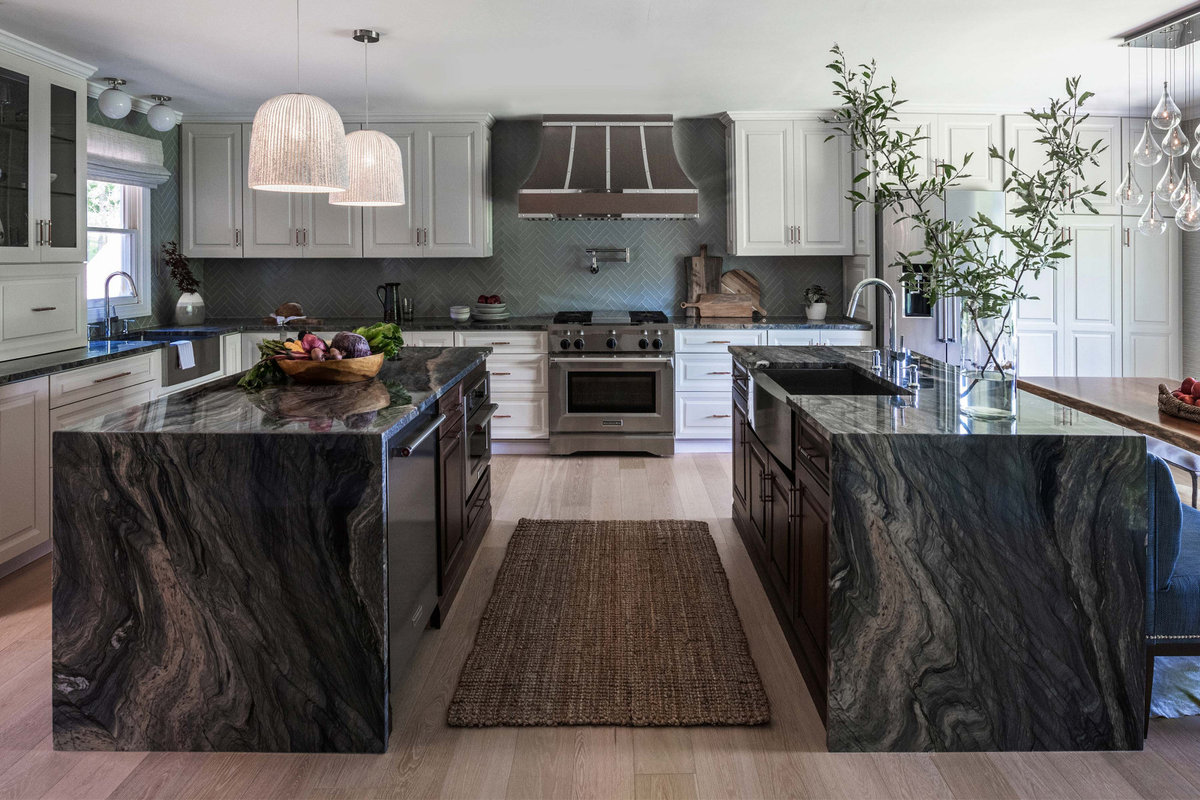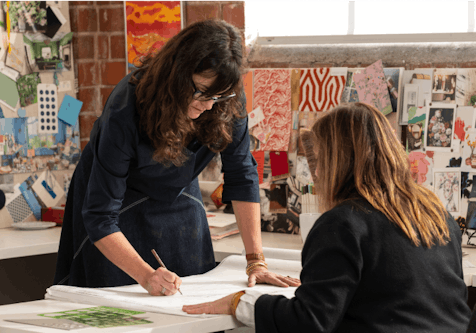Interior Designer Trevor Fulmer Lets Business Savvy Lead the Way
Learn about the smart moves this design pro makes to roll with the economy’s punches

Trevor Fulmer is a creative force backed by solid business sense. The former advertising pro opened Trevor Fulmer Design in 2019, which has had plenty of success despite the pandemic and less-than-ideal economic conditions nationwide recently — enough for him to bring on another designer and a bookkeeper, in fact. Here Fulmer shares how he did it, along with some tips that new designers and veterans alike can use to boost their own businesses.
'You Can Do It'
Fulmer began his career in experiential advertising and marketing, and had no formal design training before opening his interior design firm in Boston four years ago. “My degrees are in advertising, communication and graphic design,” he says. “So I don’t have a degree in interiors, but I often say, ’If you can do it, you can do it.’ I’m self-taught. I had some great mentors, but I’m a go-getter.” Being familiar with 3D spaces and user experiences in his advertising work helped, but the key has been good old-fashioned drive. “I push myself really hard,” he says. “I’m super self-motivated, and I love to succeed.”
While each design depends on the individual client, his firm focuses on creating luxurious spaces in what Fulmer calls “livable modern” style. “In other words, we’re probably not going to give you that solid wood chair that would look great in a photo or when people come over, but is incredibly uncomfortable and no one actually wants to sit in it,” he says. And aside from championing that livable aspect, Fulmer offers his own take on “modern” that goes beyond its ever-popular clean lines: “For me, it’s playful shapes. It’s circular in nature, its softness, it’s curved. It’s now, it’s what the trends are, what people are seeing, what they’re enjoying,” he says.
Get the Right Help
Along with bringing on another designer and a bookkeeper, Fulmer added a business coach to his team in the firm’s third year. “It’s not inexpensive, but if it’s going to increase my visibility, if it’s going to build my brand, if it’s going to make me more profitable, I don’t think you can go wrong,” he says. The coach doubles as a financial advisor, advising on profitability measures, staff hires, pay rates and more — and Fulmer considers it a very worthwhile investment.
“I think that’s a big part of design school that’s often missed — the business part,” he says. “Such as, how do you be profitable? How do you charge? What are your fees? How do you develop a contract? How do you hire people?” A business coach can make a huge difference in those and other areas, and Fulmer is happy to listen to his coach’s ideas.
“My old boss once said to me, ‘Surround yourself with people who are smarter than you.’ I think that’s some of the best advice I’ve ever received,” he says. “I think it’s important to bring those people on to your team.”
Don’t Stop Believing
“Your time will come,” Fulmer offers by way of advice to his self of four years ago, on the cusp of opening his interior design firm. “Peers will respect your talent, and the right clients will come, and your team will grow and your experience will become better. You’ll become more creative, and you’ll surround yourself with people who build you up.” He adds, “Don’t compare your beginning to someone else’s middle” — apt advice for any new designer. “All in all, don’t be so hard on yourself.”
And although he never seems to rest on his laurels too long, “I think it’s important to remember where you started,” he says, “and where you are and how much you’ve learned throughout that time — the relationships you’ve created, the spaces you’ve designed, the publicity and the PR that you’ve received. The accolades, the awards that you’ve been given. I think it’s great to look back and see that evolution of how hard work does pay off.”
One thing Fulmer learned early on is that he’s not one to sit around and do nothing in slower times. When the pandemic hit less than a year after he opened his firm, he reviewed his skill set and landed upon his graphic design experience, then came up with patterns to turn into wallpaper and rugs.
“That’s the creative portion of it,” he says. “Then I’m like, ‘Well, where the heck am I going to get this produced? Who’s going to manufacture this?’ Through a lot of Google research, through a lot of vetting, I found a wallpaper manufacturer in Connecticut that produces all of my wallpaper. Then I have two master weavers, one in India and one in Nepal, that I work with to produce my rugs. Now we’re working on a furniture collection with a furniture builder out of Virginia.”
Creating those additional revenue streams is a great example of switching gears when needed. “It’s finding the opportunity when things slow in one area and pivoting and focusing it on another,” he says. “You just put some trust out there, and you say, ‘If we’re not going to get a project, we’re going to pivot.’ If it’s not profitable at that moment, you know that in the future, it’s money well spent because you can then grow that part of the business.”
Embrace Tech
Fulmer credits Houzz Pro all-in-one software with being integral to his business’ efficiency, visibility and overall professionalism. “I don’t know how someone could do without it,” he says. For starters, “we get a lot of client leads from Houzz; we have people reaching out for all various size projects. The visibility we get through Houzz and the fact that projects and inquiries do come through that platform obviously has built my brand and built my business.”
He finds the software’s time tracking feature especially valuable, along with its tracking features in general: “knowing when something is ordered, knowing when it’s shipped, knowing when it arrived” help him manage projects smoothly, he says. “We’re a luxury business in a luxury industry, and it’s important that we be able to streamline and keep our process organized,” he explains, “and be able to communicate to our clients efficiently to make sure they know when bills are paid, when invoices are received. Houzz Pro allows us to do all of that. There are just so many beneficial components.”
And, because clients never even need to be aware of what goes on behind the scenes, the software helps create a great client experience. “Clients get their invoices, they see their products, they arrive in their house and everyone’s happy,” Fulmer says, “when we know behind the scenes, ‘You had three coffee tables arrive, because two of them were damaged to the receiving warehouse. You were never billed for any of that, and you don’t know.’ That behind-the-scenes work really makes the overall client experience run smoothly, and I think really that’s what Houzz Pro is able to do.”
As for the fear that tech solutions, particularly artificial intelligence, will one day replace human designers, Fulmer isn’t worried. In fact, he embraces their benefits. “I think there was a point when computers first came out, some people thought, ‘Computers are going to take over and we’re not going to be needed,’” he says. “Then we realized, ‘Oh wait, a computer’s like a pencil. You can use that tool to make something better, to be more efficient with your time, to be more creative. I think we’re just going to have to use that same mentality with VR and AI and all this automation. How are we going to use these tools to make our life easier?”
For designers who are hesitant to use these kinds of tools, Trevor is sympathetic but also strongly encouraging. “We all have a little bit of the mentality of being old dogs, and we can’t do new tricks,” he says “That’s why you have to start bringing in people that can do those things. I would say, if it’s going to make your life easier, the investment of time upfront is worth it. In the end, it’s going to be a time-saving asset. Give Houzz Pro a try and see how it works out, and I think you’ll be pretty happy with it.”
Consider the Next Step
Even as his business is flourishing, Fulmer says he continues to ask himself, “What’s that next big step? Is it bigger budgets? Is it more creativity? Is it expanding outside of the New England area? Is it a bigger brand with more recognition?” He also readily acknowledges that “I don’t even know all the questions that I should be asking myself, which is probably the scariest part,” he says. “You take each day, and you learn from other people, and you have mentors. You make some mistakes along the way, but somehow in the end, it typically works out.”
With his carefully considered team and tech tools supporting his business at every turn, along with his focus on both creativity and sound business practices, Fulmer is on track to garner even more five-star reviews, magazine spreads and other accolades for Trevor Fulmer Design— no matter what the economy happens to be doing.
Join the conversation by commenting or asking a question below. The Houzz team reads every single comment, and we’ll get back to you by email if you need us!

Want advice delivered to your inbox?
Unlock industry insights and updates for contractors and design pros
By signing up, I agree to the Houzz Terms of Use and Privacy Policy and that Houzz may use my information to contact me about relevant content, products, and services.











DANE AUSTIN INTERIOR DESIGN Boston & Cambridge